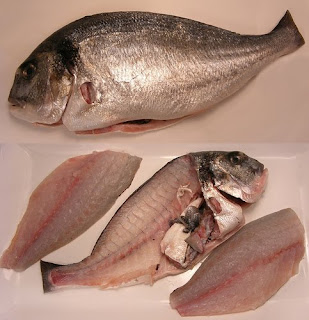Menhaden, and the Continuing Battle for the Food Chain

As someone who makes a living trading in seafood for human consumption I have the opinion that the wholesale taking of a valuable natural resource by only a hand full of people is not good. Apparently there are even a few elected officials that are of the same opinion. I think that the effects of the Menhaden fishery is similar to the corn for ethanol scheme. By removing these fish from the food chain it no doubt effects the fish that rely on them for food. The other added benefit of that menhaden, and fish like them offer is the improvement of water quality as they filter feed upon algae, and detritus. Now that "Friend of the Sea" has sold them the sustainability label the fight to protect them might be harder.

Below are two recent articles for your consideration:
Taken from Asbury Park Press 5/16/2008
Bunker Bills Will Protect This Valuable Resource
Two Republican congressmen are pushing legislation that would provide further protection to menhaden stocks that are so vital to the Atlantic ecosystem.
Rep. Jim Saxton, R-NJ., introduced a bill, H.R. 3840, that would impose a partial moratorium on commercial menhaden fishing while more research is conducted on the health of the fish population.
Rep. Wayne Gilchrest, R-Md., went further with a bill that would impose an immediate five-year moratorium on menhaden fishing.
Both bills were reviewed by the House Fisheries, Wildlife and Oceans Subcommittee May 8. Saxton is a senior member of the subcommittee.
"Atlantic menhaden are a key piece of the Atlantic ecosystem from
Saxton wants the moratorium on the commercial reduction fishery for menhaden until a scientifically-determined catch level can be established that also considers the role of menhaden in the ecosystem.
The bill would prohibit commercial menhaden fishing in the U.S. Exclusive Economic Zone that extends from three miles to 200 miles into the
Saxton said the "reduction fishery" menhaden are not used as human seafood, but are reduced for industrial purposes, agricultural fertilizer or feed for poultry and aquacultural processes as well as in nutritional supplements.
Dr. Bruce Franklin of
"Menhaden are a primary food source of game fish that are crucial to
"Menhaden are a poster-fish for why we need to consider the ecosystem in the way we manage our fisheries," he said at the hearing. "More research and studies are needed to determine the health of menhaden populations and what level is a truly sustainable catch.
"But the danger signs clearly point to the need for protection measures now for what is often called "the most important fish in the sea,' " he concluded.

Omega Protein qualifies for Friend of the Sea Certification
Independent audit and official scientific data confirm US
© FRIENDOFTHESEA.org - Pubblicata il
Friends of the Sea, which is an independent organization known for its thorough certification procedure, used the following guidelines to certify applicants for sustainability: (a) target stocks cannot be considered overexploited; (b) the applicant’s fishing methods cannot impact the seabed, and (c) generation of less than average (8%) discards. Omega Protein has met this criterion.
«The menhaden fishery, the second biggest fishery in the United States, has been found compliant with Friend of the Sea standards by an independent audit,» comments Dr Paolo Bray – Director of Friend of the Sea. «This is a great result for Friend of the Sea, which would have not been possible without Omega Protein’s strong environmental commitment. Omega Protein is also a large international fishmeal producer – others are going to be audited in the next few months and a first Friend of the Sea sustainable fishmeal will soon be on the market. We expect the collaboration of fishmeal producers: the aquaculture market is ready and already demanding certified sustainable fishmeal.»
Omega Protein is the world's largest manufacturer of heart-healthy fish oils containing Omega-3 fatty acids for human consumption, as well as specialty fish meals and fish oil used as value-added ingredients in aquaculture, swine and other livestock feeds. Omega Protein makes its products from Atlantic menhaden (Brevoortia tyrannus), Gulf menhaden (Brevoortia patronus), an Omega-3 rich fish that is abundantly available along the U.S. Gulf of Mexico and
«We believe Friend of the Sea’s approval further emphasizes Omega Protein’s marine conservation and environmental protection efforts. Our well managed fishery has gone on for centuries and this is further evidence that it is sustainable.» states Joseph L. von Rosenberg III, President and CEO of Omega Protein. «We want consumers to know Omega Protein is a Friend of the Sea.»
The database of gulf menhaden is among the best in the
The United States Menhaden fishery is considered to have zero percent discard rate according to FAO «Discards in World Marine Fisheries. An Update». Bycatch of other fishes in menhaden purse seines has been examined repeatedly since late 1800s. Taking of non-target species is a relatively rare event, and the overall bycatch is insignificant.
The Company utilizes a fleet of purse seine fishing vessels supported by spotter aircraft to supply menhaden to its four processing facilities in


Comments